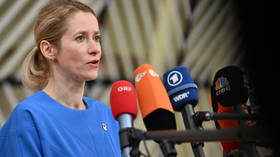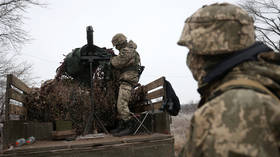EU state makes U-turn on extraditing Ukrainian draft dodgers

Estonia will not extradite Ukrainians who are fit for military service back to their homeland, Prime Minister Kaja Kallas has said, insisting that if Kiev wants more potential conscripts to return, it will have to convince them on its own. The PM’s remarks come after the country’s interior minister had earlier signaled that Tallinn was ready to hunt down suspected Ukrainian draft dodgers.
In an interview with the Kyiv Independent newspaper on Saturday, Kallas acknowledged that she’d discussed with President Vladimir Zelensky the fact that around 36,000 Ukrainian refugees – many of whom are of mobilization age – now live in Estonia having fled their country.
The premier told the newspaper she believed that those people had every right to reside in the country’s territory if they followed the rules and if the EU had given them a temporary protection status.
“So, we will definitely not do anything on our side to give those people out. It is up to Ukraine to turn to the people who are here and request them to come back to help their motherland,” she stressed.
Kallas’ comments contradicted remarks made last month by Interior Minister Lauri Laanemets, who suggested that Estonia could handle finding Ukrainians fit for combat duty on its soil and hand them over to Kiev. At the time, he described the potential task as not particularly difficult, remarking that authorities usually know where refugees live and what they do.
Ukraine announced a general mobilization in February 2022, barring most men aged between 18 and 60 from leaving the country. Kiev’s draft campaign has been marred by widespread corruption, with thousands attempting to flee the country by either forging documents or attempting to bypass border controls.
Meanwhile, President Zelensky revealed last month that his military had asked him to mobilize an additional 500,000 troops to replenish battlefield losses. Since late December, the Ukrainian parliament has been mulling new conscription legislation, although no bill has been passed yet.
With many Ukrainians eager to avoid being sent to the frontline, former Ukrainian prosecutor general Yury Lutsenko suggested earlier this month that Kiev could convince them to change their mind by publicly acknowledging the true scale of losses. According to the ex-official, Zelensky’s government has to admit that the military had lost 500,000 troops since the start of the conflict, to convey the sentiment that the country’s very survival is now at stake.













